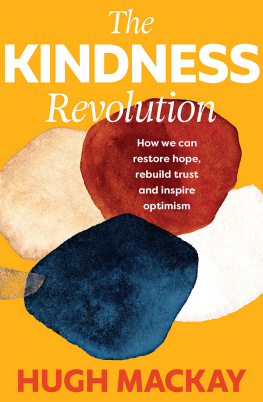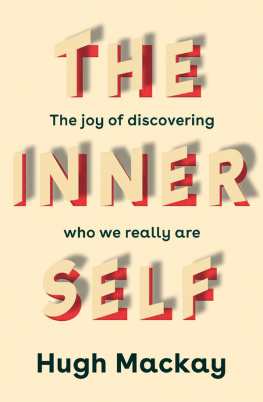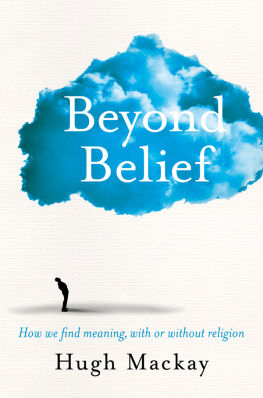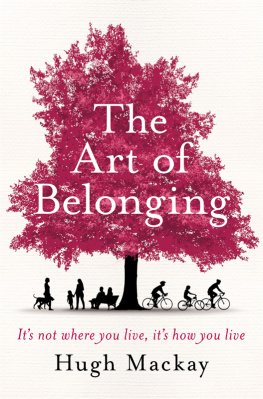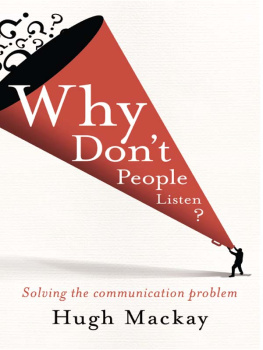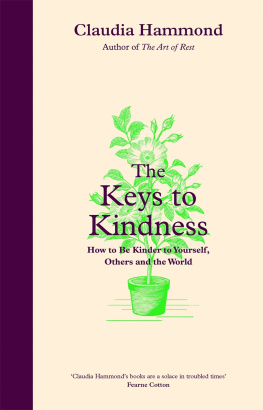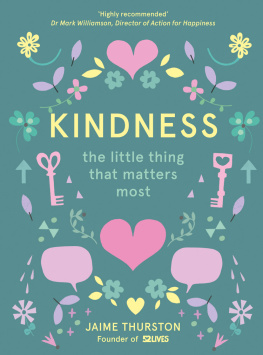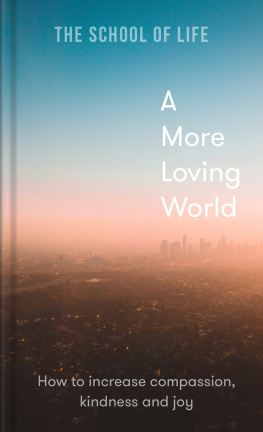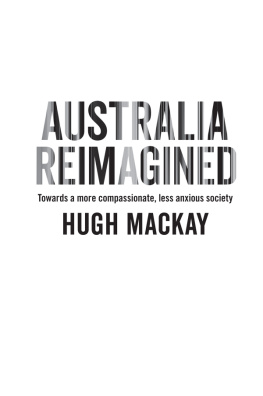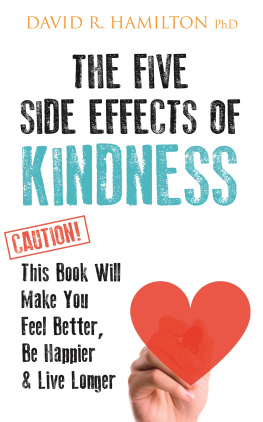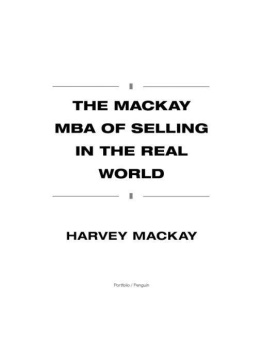
Also by Hugh Mackay
Non-fiction
Reinventing Australia
Why Dont People Listen?
Generations
Turning Point
Media Mania
Right & Wrong
Advance Australia Where?
What Makes Us Tick
The Good Life
The Art of Belonging
Beyond Belief
Australia Reimagined
The Inner Self
Fiction
Little Lies
House Guest
The Spin
Winter Close
Ways of Escape
Infidelity
Selling the Dream
The Question of Love
Permission to reproduce lines from Forgiveness (p. 142) by Elizabeth Jennings from The Collected Poems, Allen & Unwin, courtesy of David Highman Agents.
Lines from Erin Belieu As for the Heart (p. 212) from Come-Hither Honeycomb copyright 2020, 2021 reprinted with permission of The Permission Company, LLC on behalf of Copper Canyon Press, coppercanyonpress.org.
First published in 2021
Copyright Hugh Mackay 2021
All rights reserved. No part of this book may be reproduced or transmitted in any form or by any means, electronic or mechanical, including photocopying, recording or by any information storage and retrieval system, without prior permission in writing from the publisher. The Australian Copyright Act 1968 (the Act) allows a maximum of one chapter or 10 per cent of this book, whichever is the greater, to be photocopied by any educational institution for its educational purposes provided that the educational institution (or body that administers it) has given a remuneration notice to the Copyright Agency (Australia) under the Act.
Allen & Unwin
83 Alexander Street
Crows Nest NSW 2065
Australia
Phone:(61 2) 8425 0100
Email:
Web:www.allenandunwin.com

ISBN 978 1 76087 993 8
eISBN 978 1 76106 176 9
Set by Midland Typesetters, Australia
Cover design: Alissa Din
To Sheila and to Donald
Kindness is in our power, even when fondness is not.
Samuel Johnson (17091784)

We had never previously witnessed an outpouring of love like it. The empty carparks. The lack of traffic. The deserted school playgrounds. Pubs and restaurants closed. People keeping a respectful distance from each other when they had to mingleat the supermarket, in a takeaway coffee line, at a bus stop. People wearing masks when asked to do so. Neighbours looking out for each other, especially for the frail aged and others at risk of social isolation morphing into loneliness.
Some people found it spooky. Some found it sad. Some simply ignored it all and tried to carry on as if nothing had changedthus risking their own and others health. Most of us, though, accepted the seriousness of the situation and abided by the regulations, heeding the advice that staying home, or wearing masks, or keeping our distance from each other would save lives (including our own).
There were, of course, people who had to leave home: healthcare workers, supermarket and other food-supply workers, transport workers, garbage collectors, police all those who provide the essential services that ensure our safety and our very survival. For them, the act of love was not staying home.
But why call it an outpouring of love? By modifying our behaviour so radically in response to the prolonged threat from COVID-19, we were showing our care and concern for each other; our willingness to make personal sacrifices for the common good. And those are signs of the purest form of human love: the love that has nothing to do with emotion or affection; the love that says we will treat each other kindly and respectfully, regardless of how we happen to feel about each other, because we know thats the only way a human community can thrive.
This is not a book about the impact of COVID-19, but it does offer some reflections on the impressive human capacity to cope with lifes inevitable disruptions, upheavals and catastrophes (whether environmental or personal) and the unexpected benefits that often follow such experiences. The generation of Australians who endured the Great Depression of the 1930s as young adults typically looked back on that period with a kind of gratitude for the way it shaped their values and clarified their priorities for the rest of their lives: It was the making of us. They became famous in their families for their austerity and restraintsaved pieces of string a favourite symbol of their commitment to waste not, want notand for their strong sense of neighbourliness. They were also the generation who coined the term Me Generation for the post-war baby boomers, because the boomers seemed so materially self-indulgent, headstrong and socially adventurous by comparison with their depression-era parents or grandparents.
Will we now see a COVID Generation emerging among todays equivalent of those young adults of the depression? Almost certainly. The Millennials (formerly known as Gen Y) who, in 2021, are aged between their late twenties and early forties, have already proved themselves to be a resilient generation, shaped by the experience of being the offspring of our most divorced generation of parents, having to face highly competitive education and job markets, and adapting to a culture of impermanencegraphically symbolised by everything from the swiftly changing world of IT to the looming threat of cataclysmic climate change effects.
How will they be changed? How are any of us changed by disruption and by a heightened sense of lifes uncertainties? Either we become frustrated and let our frustration boil over into anger and recklessness, or else we think more clearly about what really matters to us. We consider which values are worth clinging to. We become more caring, since thats the inevitable consequence, for most of us, of realising just how interdependent and interconnected we really are. We also become more resilient.
By resilience, I mean flexibility and adaptability; a kind of buoyancy; a capacity to endure; a determination not to be defeated or victimised by adversity but to find a way through it or around it, and to prevail.
The process of building resilience always involves some pain and sacrifice as well as patience and courage. Not everyone copes well with that; not everyone thrives; not everyone behaves honourably when the going gets tough. But, fortunately, most of us do, and the strength we draw from belonging to caring and supportive families, friendship circles, neighbourhoods and other groups and communities is what usually makes the difference.
During the COVID-19 pandemic, we demonstrated that we can be kind and compassionate on a large scale. Is it too much to hope that the lessons learned under the pressure of restrictions imposed on us might be applied more generally? Could we become renowned as a loving country, rather than simply a lucky one? Might a kindness revolution lead, for example, to a more energetic commitment to reconciliation with our First Peoples, or a more humane response to people who come here legitimately seeking asylum, or a more determined effort to eradicate poverty and homelessnessto say nothing of more urgent action in the face of the looming effects of climate change? Might we finally stamp out racism, sexism, ageism?
Next page
